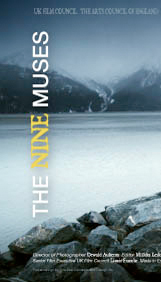Diving head first into identity crisis and refusing to come up for air, John Akomfrah‘s experimental docu-essay The Nine Muses asks us to question our own identity and the genesis of such a question. The director uses Homer’s The Odyssey as a narrative tool, the blind man’s prose fading in to guide the film along on its long journey with no real place to call home. The Nine Muses, much like Homer’s epic, finds meaning in the journey itself rather than the ultimate conclusion.
Homer’s not the only ghost in the room. Akomfrah employs the words of other great artists who struggled with this very same question of identity, from faith-torn John Milton to expatriate Irishman James Joyce to self-imprisoned Emily Dickinson. These deep thinkers drowned in their own internalizations. Akomfrah dares us to do the same.
His platform for such an observation is the vast migration into Britain after World War II and the subsequent increase of racial strife. What can a man from Ghana know of what it means to be a Englishman? What can’t he ever know?
These unanswerable questions are complimented by meandering images of hooded figures walking to and from an icy shore, up and down frozen roads as cars fly past with purpose. The film is split into 9 chapters, one for each muse the Greek Mnemosyne gave birth to: Calliope (Epic Poetry), Clio (History), Erato (Love), Euterpe (Music), Melpomene (Tragedy), Polyhymnia (Hymns), Thalia (Comedy), Urania (Astronomy).
Despite its chapters, the film is one, complete thought pushed forward by an array of music, varying from classical to blues to hymnals. Archive footage of 1950s Britain clash with these modern-day wanderers with nowhere to go. Long, wide shots of abandoned waterfront factories and forever-anchored ships are at once eerie and nostalgic. Godfrey Reggio would be proud of Akomfrah’s patience here.
Through and through a work of art, The Nine Muses‘s unapologetic lack of pandering or narrative coherence will push many over the limit. After all, it’s less a film than it is a sermon. A sermon sans religion, orated by some of the most revolutionary thinkers in history. That the images are as engaging and entrancing as they are is merely icing on top of a thick, multi-layered cake of self-exploration.

Do you know John Akomfrah? Are you intrigued by his The Nine Muses?


